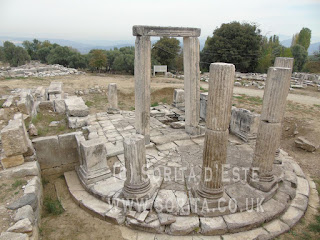Earliest archaeological record of Hecate worship is an altar
inscription dated to 6th century BCE in the sanctuary of Apollo
Delphinios in Miletos in what is now Turkey.
This archeological evidence seems to point to the fact that Hecate was
not simply a Roman Goddess or a Greek Goddess but actually a Goddess that
predates both of these civilizations and was adopted into their pantheon well
after her cults in Asia Minor worshiped her.
Her temple ruins are open for visits today in Lagina. (Link)
Temple at Lagina - by Sorita d'Este - LINK
Leo Ruickbie's "Witchcraft out of the Shadows – A History”
says that the ancient Greeks observed a feast day on August 13 to appease the
Goddess and protect the harvest, This
also references the Deiphon or Hecate’s Supper, leaving offerings to the
Goddess at the crossroads. He goes on to
say that the Romans honored the 29th of every month as the Moon of
Hecate – using Diane Stein's un-sourced work, “The Goddess Book of Days" as
his source.
Ruickbie also says that a calendar was found the made
references to offerings left to Hecate on the first, second and seventh days of
every month, sourcing Graf 1985 163, 185.
I am still looking for this source.
In Queen of the Night : Rediscovering the Celtic Moon Goddess by
Sharynee MacLeod NicMhacha page 60 – she also references the Erythia Calendar
from the 4th Century.
Since we
know that our modern calendar is nothing like the calendar the ancients would
have followed I believe it is safe to say that any festival or celebrations
that cites a Gregorian calendar month/day is probably not based on any actual
historic sources. We can compare these
days to the lunar equivalents again, it would be a guess. We know that our ancestors followed the
seasons and lunar cycles. I tend to move
my offerings to Hecate in that same manner.
I lean more
towards working with her on Samhain, due to the ancestral work or working with
the dead. I have recently seen a connection between her and autumn. While it is probably a “duh” moment for most
as she is related to the myth of Persephone, I just “got it” recently. I’ll be investigating this further in the
years to come. I can’t say that I’ll add
anything additional to my normal rituals to her based on this connection but I
will investigate it.
I found a
couple of links to Greek and Roman calendars which I have included for
reference.
List of Greek Festivals – Link
List of Roman Festivals – Link
When I purchased
Witchcraft – Out of the Shadows – A History, I originally purchased it to find
out finally where the idea that a set day in our modern calendar was dedicated
to Hecate. For that part, the book was
less than pleasing. There is one references to the date and a footnote related
to it and it seems that everyone on the web, even myself in earlier writings,
repeated this day without a thought to where it originated. For now, I can say that there is no real
historical evidence that this day is more or less significant to Hecate or her
ancient cults.
Moral of the
story – Sources are critical kids!
UPDATE- finally a reference to August 13th for Hecate- Thanks to Sara Croft for sharing this wonderful discovery. - Andrew Alfoldi, Statius' Silvae mentions the procession of torchbearers in honor of the dies Triviae, of whom for the Romans Hecate was one (on p. 141)
Alfoldi, Andrew. "Diana Nemorensis," American Journal of Archaeology, Vol. 64, No. 2 (Apr. 1960), p. 137-144.
UPDATE- finally a reference to August 13th for Hecate- Thanks to Sara Croft for sharing this wonderful discovery. - Andrew Alfoldi, Statius' Silvae mentions the procession of torchbearers in honor of the dies Triviae, of whom for the Romans Hecate was one (on p. 141)
Alfoldi, Andrew. "Diana Nemorensis," American Journal of Archaeology, Vol. 64, No. 2 (Apr. 1960), p. 137-144.










No comments
Post a Comment